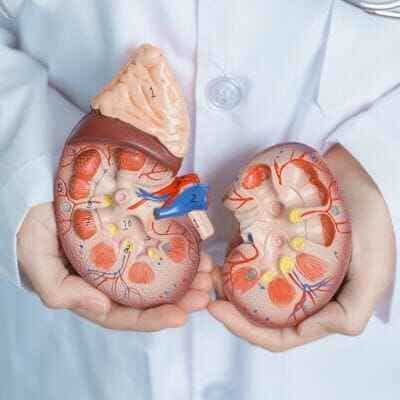What is Kidney Shrinkage?
Kidney shrinkage, also known as renal atrophy, refers to a condition in which the size of the kidneys decreases. The kidneys are vital organs responsible for filtering waste products and excess fluids from the blood, producing urine, and maintaining a proper balance of electrolytes in the body.
Book Free Consultation
Causes Of Kidney Shrinkage?
Blood Flow Issues:
- Renal artery stenosis: Narrowing of the artery supplying blood to the kidney.
- Atherosclerosis: Hardening and narrowing of arteries (affects overall blood flow).
- Blood clots: Blocking the artery that supplies blood to the kidney.
Blockages and Infections:
- Blocked urinary tract: Pressure on the kidneys due to blockages.
- Kidney stones: Untreated stones causing long-term damage.
- Chronic kidney infections: Pyelonephritis and reflux nephropathy.
Other Conditions:
- Congenital dysplasia: Kidney not fully developing or growing properly.
- Autoimmune diseases: Lupus or antiphospholipid syndrome targeting the kidneys.
- Metabolic syndrome: Combination of conditions that increase kidney disease risk.
- Diabetes and high blood pressure: Long-term damage to kidney function.
- Sickle cell disease: Abnormal red blood cells causing kidney complications.
- Cancer: Tumor growth affecting kidney function.
Symptoms Of Kidney Shrinkage
Urinary changes:
- Increased frequency: Need to urinate more often, especially at night.
- Decreased output: Passing less urine than usual.
- Foamy or bubbly urine: Indicates protein leakage.
- Blood in urine: Can be a sign of infection or damage.
General symptoms:
- Fatigue and weakness: Feeling constantly tired and lacking energy.
- Loss of appetite: Difficulty eating or maintaining interest in food.
- Itchy skin: Dry, itchy skin can be a sign of waste buildup in the blood.
- Nausea and vomiting: Feeling sick and throwing up.
- Muscle cramps: Uncontrolled involuntary muscle contractions.
- Swelling: Puffiness in hands, feet, ankles, or around the eyes.
- High blood pressure: Can be a consequence of decreased kidney function.
- Difficulty concentrating: Mental fog and trouble focusing.
- Shortness of breath: Difficulty breathing due to fluid buildup in the lungs.
Who is at a Higher Risk?
- Newborns and Infants: Congenital anomalies or birth defects can cause small or underdeveloped kidneys.
- Children and Adolescents: Kidney infections, reflux nephropathy (urine backup), or trauma can lead to shrinkage.
- Middle-aged and Older Adults: Ageing itself causes a gradual decline in kidney function and size, usually after 50 years.
- Any Age: Conditions like chronic kidney disease, high blood pressure, diabetes, and autoimmune diseases can affect people of any age.
People at Higher Risk:
- Individuals with pre-existing kidney conditions: Those with congenital malformations, existing chronic kidney disease, or a single functioning kidney.
- People with uncontrolled chronic diseases: Diabetes, high blood pressure, and autoimmune diseases can significantly increase the risk.
- Individuals with a history of recurrent urinary tract infections: Repeated infections can damage the kidneys over time.
- Those with poor lifestyle habits: Smoking, excessive alcohol consumption, and an unhealthy diet contribute to kidney damage.
- People exposed to certain toxins: Heavy metals, certain medications, and environmental toxins can harm the kidneys.
- Family history of kidney disease: Genetic factors can increase susceptibility to specific kidney conditions.
How To Diagnose Kidney Shrinkage?
Blood tests:
- Estimated glomerular filtration rate (eGFR): This test measures the waste-filtering function of your kidneys.
- Serum creatinine: This measures the level of creatinine, a waste product filtered by your kidneys.
- Blood urea nitrogen (BUN): This measures another waste product filtered by your kidneys.
- Cystatin C: This is a newer marker of kidney function.
Urine tests:
- Urinalysis: This checks for protein, blood, and other abnormalities in your urine.
- 24-hour urine test: This measures the amount of protein, creatinine, and other substances in your urine over a 24-hour period.
Imaging tests:
- Kidney ultrasound: This provides images of your kidneys to assess their size, shape, and blood flow.
- CT scan: This can provide more detailed images of your kidneys and surrounding structures.
- MRI scan: This can provide even more detailed images of your kidneys and surrounding structures.
Additional tests:
- Kidney biopsy: In some cases, a small tissue sample from your kidney may be needed to determine the cause of the shrinkage.
- Genetic testing: This may be used to identify any underlying genetic conditions that could be contributing to the kidney shrinkage.
Complications Of Kidney Shrinkage
- Kidney Failure: If both kidneys experience significant shrinkage and lose function, total kidney failure can occur. This is a life-threatening condition requiring immediate medical intervention.
- Electrolyte Imbalances: Shrunken kidneys have difficulty regulating electrolytes like potassium, sodium, and calcium, leading to imbalances that can impact nerve and muscle function, heart rhythm, and blood pressure.
- High Blood Pressure: Kidney shrinkage can disrupt blood flow and hormone production, contributing to high blood pressure and increasing the risk of cardiovascular complications.
- Anemia: Shrunken kidneys may not produce enough erythropoietin, a hormone stimulating red blood cell production, leading to anemia and fatigue.
- Bone Disease: Impaired vitamin D activation by shrunken kidneys can lead to bone deformities and increased risk of fractures.
- Acid buildup: Kidneys help regulate blood pH. Impaired function due to shrinkage can lead to excess acid buildup in the blood (acidosis), affecting various organs.
- Weakened immune system: Shrunken kidneys may not adequately eliminate waste products, creating a toxic environment that weakens the immune system, increasing susceptibility to infections.
- Fluid retention: Shrunken kidneys may struggle to remove excess fluid from the body, leading to swelling in ankles, feet, and lungs (pulmonary edema).
- Malnutrition: Loss of appetite and impaired nutrient absorption due to kidney dysfunction can lead to malnutrition and muscle wasting.
- Sexual dysfunction: Hormone imbalances and decreased blood flow caused by shrunken kidneys can affect sexual function and fertility.
Ayurvedic Treatment For Kidney Shrinkage
Kidney shrinkage is a concerning health issue affecting many individuals today. Ayurvedic treatment for renal shrinkage has gained prominence as a holistic and natural approach to address this condition. In Ayurveda, the emphasis is on balancing the body's doshas and promoting overall well-being. Kidney shrinkage ayurvedic treatment focuses on herbs like Punarnava, Gokshura, and Varuna, known for their rejuvenating properties. These herbs help in improving kidney function, reducing inflammation, and preventing further damage. With kidney shrinkage treatment in Ayurveda, patients can experience not only symptom relief but also long-term benefits for their renal health. Embrace the ancient wisdom of Ayurveda for a holistic approach to kidney health.
Ayurvedic Medicine For Renal Shrinkage
Here are a few Ayurvedic herbs that are commonly suggested for kidney health:
- Punarnava (Boerhavia diffusa): Punarnava is known for its diuretic properties and is believed to help in maintaining kidney function. It is often used in Ayurveda for managing conditions related to the urinary system.
- Gokshura (Tribulus terrestris): Gokshura is thought to have diuretic and anti-inflammatory properties. It is traditionally used to support kidney function and address urinary problems.
- Varuna (Crataeva nurvala): Varuna is considered beneficial for kidney and urinary tract health. It is believed to have diuretic and anti-inflammatory effects.
- Chandraprabha Vati: This Ayurvedic herbal formulation contains a combination of herbs, including Guggulu, Guduchi, Shilajit, and others. It is often used to support kidney function and maintain urinary tract health.
- Pashanabheda (Bergenia ligulata): Pashanabheda is traditionally used to address urinary tract issues, and it is believed to have diuretic properties that may support kidney health.
Why Choose Ayuraura
Ayuraura is a renowned Ayurvedic clinic that offers a unique and effective approach to treating renal shrinkage. Here are some reasons why you should choose Ayuraura for renal shrinkage:
- Experienced and qualified Ayurvedic practitioners: The team at Ayuraura consists of highly qualified and experienced Ayurvedic doctors who have a deep understanding of renal shrinkage and its treatment. They will work with you to create a personalized treatment plan that is tailored to your specific needs.
- Traditional Ayurvedic treatments: Ayuraura uses traditional Ayurvedic treatments that have been proven to be effective in treating renal shrinkage. These treatments include herbal remedies, Panchakarma therapy, and yoga.
- Holistic approach: Ayuraura takes a holistic approach to treatment, which means that they address not only the physical symptoms of renal shrinkage but also the emotional and mental aspects. This approach is essential for long-term healing.
- Natural and authentic treatments: The treatments offered by Ayuraura are all-natural and authentic.
- Positive patient outcomes: Ayuraura has a long history of success in treating renal shrinkage. Many patients have experienced significant improvement in their renal function after undergoing treatment at Ayuraura.
- Affordable treatment: Ayuraura offers affordable treatment options that are accessible to everyone.


